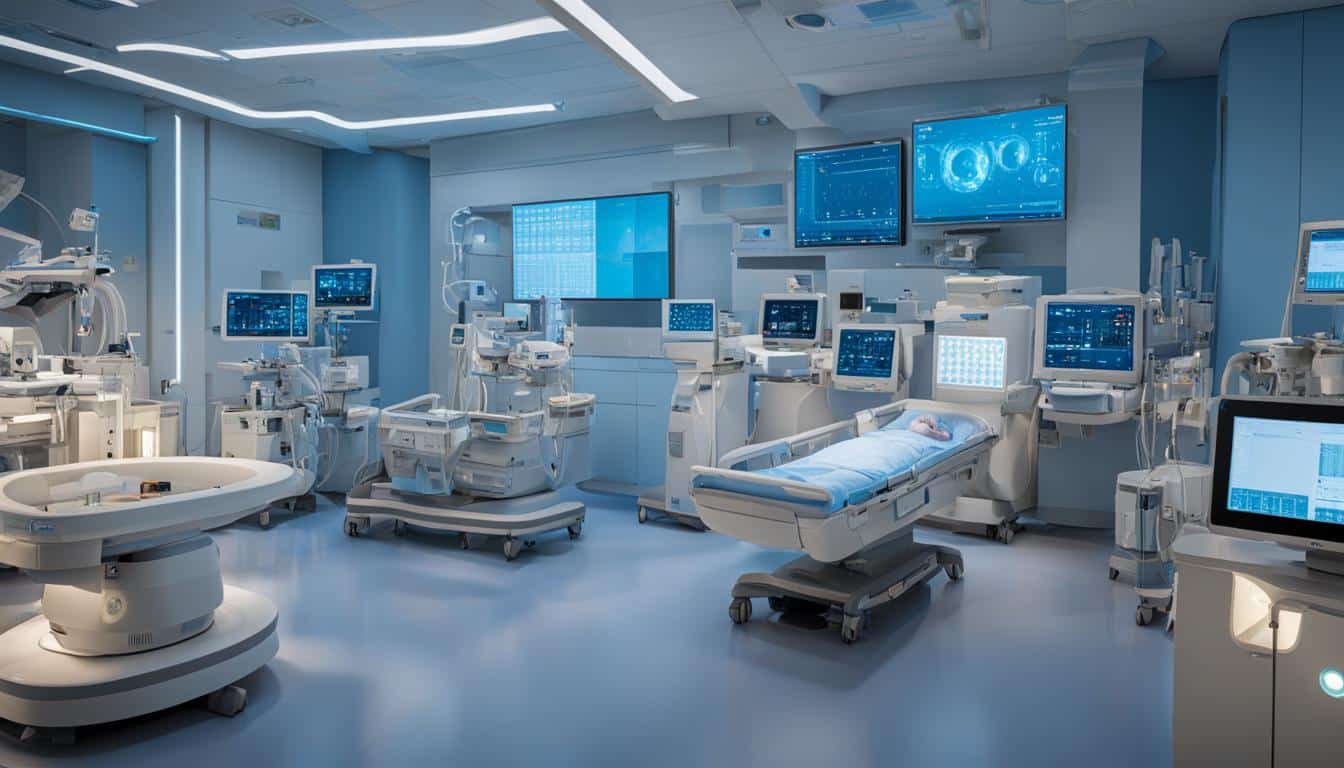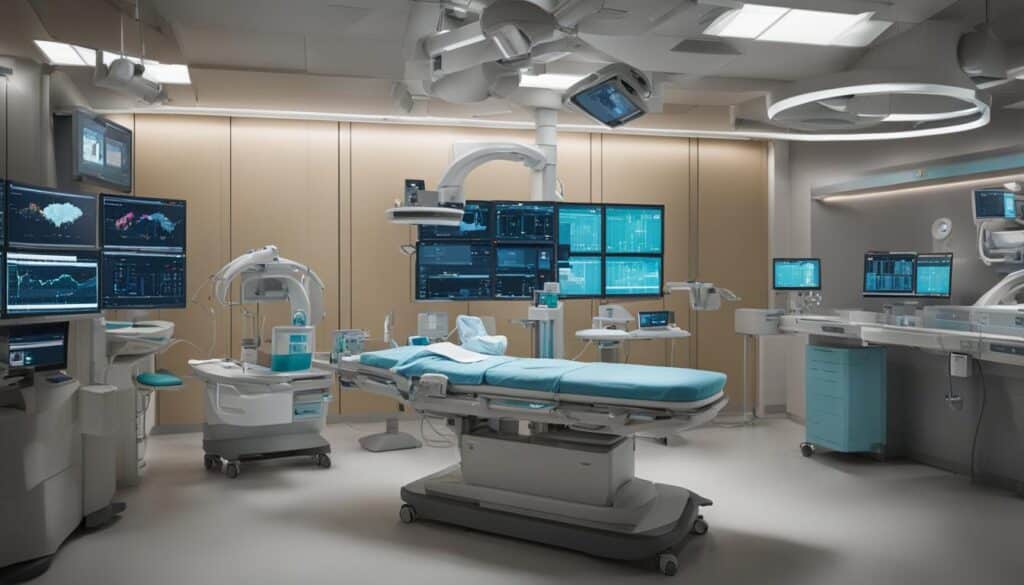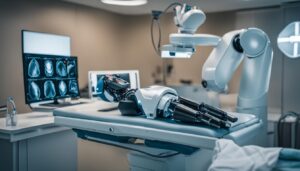
I am excited to introduce the groundbreaking advancements in neonatal care brought about by the integration of AI technologies. These cutting-edge solutions are revolutionizing the way we care for newborns and providing new hope for improved health outcomes.
AI for Neonatal Care Technologies encompasses a wide range of tools and systems that utilize artificial intelligence to enhance healthcare decisions and interventions in neonatal care units. By analyzing vast amounts of data and automating complex tasks, AI is transforming the delivery of care for infants, ultimately improving patient outcomes.
Key Takeaways:
- AI technologies are revolutionizing neonatal care and improving infant health outcomes.
- These cutting-edge solutions utilize artificial intelligence to enhance healthcare decisions and interventions.
- AI-powered diagnostics, monitoring systems, predictive analytics, decision support systems, and automation are transforming the delivery of care for newborns.
- Data privacy, biases in AI algorithms, and ethical considerations are challenges that need to be addressed.
- The future prospects for AI in neonatal care are promising, offering new hope for improved infant health outcomes.
The Role of AI in Neonatal Diagnostics
AI plays a crucial role in neonatal diagnostics by enabling the early detection of complications and facilitating accurate diagnoses. Machine learning algorithms have been developed to analyze medical images, such as X-rays and ultrasounds, to identify abnormalities and signs of diseases. Additionally, AI-powered diagnostic tools can process large amounts of patient data to identify patterns and make predictions about the likelihood of certain conditions or complications. These advancements in AI technology are helping healthcare professionals intervene earlier and more effectively in neonatal care.
Early detection of complications in newborns is vital for providing timely interventions and improving health outcomes. AI algorithms can quickly and accurately analyze medical images, allowing healthcare providers to identify potential abnormalities or signs of diseases that may not be immediately apparent to the human eye. By leveraging machine learning, AI systems can continuously learn and improve their diagnostic capabilities, leading to more precise and reliable results over time.
In addition to image analysis, AI-powered diagnostic tools can process vast amounts of patient data, including vital signs, lab results, and medical histories. By analyzing this data, AI algorithms can identify correlations and patterns that may indicate the likelihood of certain conditions or complications. This data-driven approach enables healthcare professionals to make accurate and informed diagnoses, which are essential for developing appropriate treatment plans and interventions.
The early detection of complications and accurate diagnosis enabled by AI in neonatal diagnostics can significantly impact the quality of care provided to newborns. By identifying potential health issues at an early stage, healthcare providers can intervene promptly and implement preventive measures or targeted treatments. This proactive approach can lead to better health outcomes, reduced hospital stays, and improved long-term health prospects for infants.
By harnessing the power of AI in neonatal diagnostics, healthcare professionals have access to valuable tools that enhance their diagnostic capabilities and improve patient care. These advancements in AI technology are transforming neonatal care and paving the way for more efficient and effective healthcare interventions in the future.
AI-Enhanced Monitoring Systems
AI-enhanced monitoring systems are revolutionizing neonatal care by enabling real-time data analysis and the early detection of potential health issues in newborns. These advanced systems utilize sensors and algorithms to continuously monitor vital signs and other physiological parameters, providing healthcare professionals with valuable insights into the well-being of infants. By analyzing the collected data, AI algorithms can detect subtle changes or deviations from normal patterns, serving as early warning signs for underlying conditions or complications.
Through real-time data analysis, AI-enhanced monitoring systems empower healthcare providers to intervene promptly, preventing adverse outcomes and ensuring optimal care for newborns. The ability to identify early warning signs enables healthcare professionals to take proactive measures and deliver timely interventions, maximizing the chances of positive health outcomes for infants.
Furthermore, AI-enhanced monitoring systems offer the advantage of continuous monitoring, allowing for comprehensive and accurate examination of a newborn’s health status. These systems can monitor vital signs such as heart rate, respiratory rate, temperature, blood pressure, and oxygen saturation levels, providing a comprehensive understanding of an infant’s physiological state.
By leveraging AI algorithms, healthcare professionals can access real-time data analysis, which enhances their decision-making and aids in providing individualized care plans. Moreover, the analysis of data from AI-enhanced monitoring systems can identify trends and patterns, aiding in the understanding of specific health conditions and potential risk factors. This knowledge enables healthcare providers to make informed decisions and tailor interventions to meet the unique needs of each newborn.
AI-enhanced monitoring systems have the potential to transform neonatal care by delivering actionable insights and facilitating early intervention. By utilizing these advanced technologies, healthcare providers can proactively detect potential health issues, ensure timely interventions, and improve overall neonatal care outcomes.
Predictive Analytics in Neonatal Care
Predictive analytics plays a crucial role in advancing neonatal care by leveraging AI algorithms to assess the risk of adverse events and develop personalized treatment plans. By analyzing historical patient data, AI systems can identify risk factors and patterns that may increase the likelihood of complications or poor health outcomes in newborns. This information enables healthcare providers to proactively manage potential risks and deliver more personalized and effective care, ultimately improving infants’ health outcomes.
Predictive analytics tools in neonatal care enable healthcare providers to:
- Assess the risk of adverse events
- Identify risk factors and patterns
- Develop personalized treatment plans
By leveraging AI-powered predictive analytics, healthcare providers can identify potential complications or health issues early on, allowing for timely interventions and personalized care plans. This proactive approach ensures that neonates receive the most appropriate and targeted treatments to optimize their health outcomes.

Through the power of predictive analytics, healthcare providers can identify patterns and risk factors, which contribute to the development of personalized treatment plans. These plans take into account each individual baby’s specific needs, tailoring interventions to optimize outcomes. The use of predictive analytics in neonatal care has the potential to dramatically improve the quality of care and ensure the best possible outcomes for infants.
AI-Assisted Decision Support Systems
AI-assisted decision support systems play a vital role in neonatal care, offering evidence-based recommendations and aiding in clinical decision-making. With the help of AI algorithms, these systems analyze extensive volumes of medical literature, patient data, and treatment guidelines to generate personalized recommendations for healthcare professionals. By integrating this AI-driven information into their decision-making process, clinicians gain access to the latest research findings, clinical guidelines, and patient-specific data, thus enhancing the quality of their decisions and ultimately improving neonatal care outcomes.
These decision support systems leverage AI technologies to sift through vast amounts of data and identify patterns, associations, and correlations that might not be apparent to human observers. The AI algorithms can analyze various factors such as patient demographics, medical history, laboratory results, and imaging reports to provide evidence-based recommendations tailored to each patient’s unique circumstances.
The Power of Evidence-Based Recommendations
One of the key benefits of AI-assisted decision support systems is their ability to provide evidence-based recommendations. These recommendations are derived from the analysis of extensive medical literature, clinical trials, and treatment guidelines. By leveraging AI algorithms, these systems are able to swiftly process and synthesize a vast amount of information to generate personalized recommendations that align with the current best practices and standards of care.
“AI-powered decision support systems enable healthcare professionals to make more informed and evidence-based decisions, ensuring that the treatment plans are aligned with the latest research and guidelines.” – Dr. Sarah Thompson, Neonatologist
These evidence-based recommendations empower healthcare providers to make more informed decisions regarding diagnosis, treatment options, medication dosages, and other critical aspects of neonatal care. By relying on the latest research and clinical guidelines, clinicians can feel confident that their decisions are based on the most up-to-date and reliable information available.
The Role of AI in Clinical Decision-Making
A critical component of neonatal care is clinical decision-making. AI-assisted decision support systems aid healthcare professionals in this process by analyzing complex data and providing insights that can inform clinical judgments. By leveraging AI algorithms, these systems can identify trends, predict outcomes, and offer suggestions that can guide clinicians in making well-informed decisions.
For example, AI algorithms can analyze a newborn’s vital signs, laboratory results, and clinical history to predict the likelihood of developing complications, such as sepsis or respiratory distress syndrome. These predictions can assist healthcare providers in implementing preventative measures, initiating early interventions, and implementing personalized treatment plans, leading to improved patient outcomes.
Moreover, AI-assisted decision support systems promote standardized practice by ensuring that clinical decisions are based on the same set of rules and guidelines. This consistency helps mitigate variability in care and improve overall quality and patient safety.
Ensuring Appropriate Use of AI in Decision-Making
While AI-assisted decision support systems hold immense potential, it is crucial to ensure their appropriate use in clinical decision-making. Healthcare professionals must interpret the AI-generated recommendations in the context of their patients’ specific circumstances and exercise their clinical judgment. AI algorithms, although powerful, are not infallible and may have limitations or biases that need clinical scrutiny.
Transparency and explainability are also important considerations when using AI systems. Healthcare professionals should have a clear understanding of how the AI algorithms work, what data is being used, and the limitations of the system. Clinicians should be able to verify the accuracy and quality of the data and should not blindly rely on AI-generated recommendations without considering other relevant clinical factors.
Furthermore, the ethical implications of AI-assisted decision-making also need to be carefully addressed. Balancing the benefits and risks, ensuring patient privacy and data security, and maintaining human oversight in critical decision-making are crucial factors to consider in the integration of AI technologies in neonatal care.
Benefits of AI-Assisted Decision Support Systems
| Benefits | Description |
|---|---|
| Improved Clinical Outcomes | AI algorithms provide evidence-based recommendations that can enhance the quality of clinical decisions, resulting in improved patient outcomes. |
| Efficient Decision-Making | By automating data analysis and processing vast amounts of information, AI-assisted decision support systems streamline the decision-making process, enabling clinicians to make quicker and more informed decisions. |
| Personalized Patient Care | AI algorithms can analyze patient-specific data to generate personalized recommendations, enabling healthcare providers to deliver tailored treatment plans. |
| Standardized Practice | AI-assisted decision support systems promote standardized practice by ensuring that clinical decisions are based on consistent rules and guidelines. |
| Access to Latest Research | By leveraging AI-driven information, clinicians have access to the latest research findings and treatment guidelines, facilitating evidence-based practice. |
AI-assisted decision support systems are revolutionizing neonatal care by providing evidence-based recommendations and aiding in clinical decision-making. These systems leverage AI algorithms to analyze extensive amounts of data and generate personalized recommendations that enhance the quality of care provided to newborns. By incorporating AI-driven information into their decision-making process, healthcare professionals can access the latest research findings, clinical guidelines, and patient-specific data, ultimately improving neonatal care outcomes.

AI-Powered Automation in Neonatal Care
AI-powered automation is transforming neonatal care by effectively reducing the burden of administrative tasks, leading to a significant reduction in workload for healthcare professionals. By harnessing the power of AI algorithms, neonatal care units can streamline routine administrative tasks and maximize the time spent on direct patient care.
One of the key benefits of AI-powered automation is the ability to automate data entry, documentation, and scheduling processes. This ensures that healthcare professionals spend less time on paperwork and more time providing essential care to newborns and their families. By automating these tasks, the risk of errors is significantly decreased, improving the overall quality and accuracy of care delivery.
Moreover, AI-powered automation optimizes workflow efficiency by eliminating time-consuming manual processes. This allows clinicians to focus on critical patient care activities, such as monitoring vital signs and responding to emergencies, without getting overwhelmed by administrative responsibilities.
An example of AI-powered automation in action is the automation of data entry and documentation. AI algorithms can extract relevant information from medical records and automatically populate electronic health records, saving valuable time for healthcare professionals. This not only reduces the chances of errors but also improves the accessibility and organization of patient data, resulting in better-informed decision-making.
In addition to data entry and documentation, AI-powered automation can also enhance the scheduling process in neonatal care units. By analyzing patient data, AI algorithms can predict the length of hospital stays and evaluate the availability of healthcare providers, optimizing the scheduling of procedures and consultations. This not only improves patient outcomes but also increases operational efficiency by reducing wait times and minimizing resource conflicts.
Overall, AI-powered automation in neonatal care leads to a significant reduction in administrative workload, allowing healthcare professionals to dedicate more time and attention to direct patient care. By streamlining administrative tasks, AI technologies improve efficiency, reduce errors, and enhance the overall quality of neonatal care.
The benefits of AI-powered automation in neonatal care include:
- Reduced administrative workload for healthcare professionals
- Streamlined data entry, documentation, and scheduling processes
- Improved accuracy and accessibility of patient data
- Enhanced workflow efficiency and operational effectiveness
- Increased focus on direct patient care and critical activities
Comparison of Administrative Workload Reduction through AI Automation
| Without AI Automation | With AI Automation | |
|---|---|---|
| Data Entry | Manual entry of patient information, time-consuming | Automated extraction from medical records, accurate and efficient |
| Documentation | Manual generation of reports and notes, prone to errors | Automated report generation, standardized and error-free |
| Scheduling | Manual scheduling process, potential for conflicts and delays | AI-predictive analysis, optimized scheduling for efficient care delivery |
Challenges and Ethical Considerations
The integration of AI technologies in neonatal care presents various challenges and ethical considerations. These factors must be carefully addressed to ensure the responsible and effective use of AI in this critical field.
Data Privacy and Security
One of the significant concerns surrounding AI in neonatal care is data privacy and security. As AI systems rely on vast amounts of patient data, protecting the confidentiality and integrity of this information is paramount. Robust measures must be implemented to safeguard sensitive data and mitigate the risk of unauthorized access or breaches. Healthcare organizations must adhere to strict data protection standards and comply with relevant privacy regulations.
Potential Biases in AI Algorithms
An essential consideration when using AI in neonatal care is the potential for biases in AI algorithms. These biases can arise due to inherent limitations in the training data used to develop AI models. Inaccurate or incomplete representation of diverse patient populations may result in biased predictions and decisions, leading to disparate outcomes. It is crucial to continually evaluate and address bias in AI algorithms to ensure equitable and unbiased care for all infants.
Resistance and Apprehension among Healthcare Professionals
Adopting AI-driven solutions in neonatal care may face resistance or apprehension among healthcare professionals. This could stem from concerns about job displacement or a lack of trust in AI systems. To overcome these challenges, thorough training and education programs should be implemented to familiarize healthcare providers with the benefits and limitations of AI technologies. By involving healthcare professionals in the implementation process and addressing their concerns, the successful integration of AI can be achieved.
Ethical Questions in Critical Decision-Making
The use of AI in critical decision-making raises ethical questions that need careful consideration. Although AI algorithms can support healthcare professionals in making well-informed decisions, they should not replace human judgment entirely. It is vital to establish clear guidelines and ethical frameworks to determine when and how AI should be used in critical situations. Ensuring a balance between AI-driven insights and human expertise is crucial to upholding the highest standards of care.
Addressing these challenges and ethical considerations is necessary to maximize the benefits of AI technologies in neonatal care while safeguarding patient privacy, quality of care, and the well-being of healthcare providers. By navigating these complexities, we can harness the full potential of AI to revolutionize neonatal care and improve infant health outcomes.
Conclusion
The integration of AI technologies in neonatal care holds great promise for improving health outcomes and transforming the delivery of care to newborns. Utilizing AI-powered diagnostics, monitoring systems, predictive analytics, decision support systems, and automation, neonatal care providers can greatly enhance their ability to detect, diagnose, and treat potential health issues in infants.
While there are challenges and ethical considerations to navigate, the potential benefits of AI in neonatal care are significant. By leveraging AI technology, healthcare professionals can access real-time data, make evidence-based recommendations, and intervene promptly to prevent adverse outcomes for newborns.
Looking ahead, the future prospects for AI in neonatal care are promising. As technology continues to advance, there is a great potential to further improve health outcomes and provide personalized care to newborns. By harnessing the power of AI in neonatal care, healthcare providers can offer new hope and better opportunities for improved infant health outcomes.
FAQ
How are AI technologies revolutionizing neonatal care?
AI technologies are revolutionizing neonatal care by utilizing artificial intelligence to enhance healthcare decisions and interventions in neonatal care units. They analyze vast amounts of data and automate complex tasks, transforming how neonatal care is delivered and improving patient outcomes.
What is the role of AI in neonatal diagnostics?
AI plays a crucial role in neonatal diagnostics by enabling the early detection of complications and facilitating accurate diagnoses. Machine learning algorithms analyze medical images, such as X-rays and ultrasounds, to identify abnormalities and signs of diseases. AI-powered diagnostic tools also process large amounts of patient data to identify patterns and make predictions about the likelihood of certain conditions or complications.
How are AI-enhanced monitoring systems transforming neonatal care?
AI-enhanced monitoring systems use sensors and algorithms to continuously monitor vital signs and physiological parameters in newborns. By analyzing the collected data, AI algorithms can identify subtle changes or deviations from normal patterns that may indicate the presence of an underlying condition or the emergence of complications. This early identification of warning signs allows healthcare providers to intervene promptly and prevent adverse outcomes.
How do predictive analytics contribute to neonatal care?
Predictive analytics in neonatal care leverage AI algorithms to assess the risk of adverse events and develop personalized treatment plans. By analyzing historical patient data, AI systems can identify risk factors and patterns that may increase the likelihood of complications or poor health outcomes in newborns. This information is used to develop targeted interventions and care plans tailored to each individual baby’s specific needs.
How do AI-assisted decision support systems benefit neonatal care?
AI-assisted decision support systems offer evidence-based recommendations and aid in clinical decision-making for neonatal care providers. By analyzing medical literature, patient data, and treatment guidelines, AI algorithms generate personalized recommendations for healthcare professionals. This integration of AI-driven information enhances the quality of their decisions and improves neonatal care outcomes.
How does AI-powered automation streamline neonatal care?
AI algorithms automate routine tasks such as data entry, documentation, and scheduling in neonatal care, reducing the burden of administrative tasks on healthcare professionals. This automation allows clinicians to spend more time with their patients, reducing the risk of errors and improving the efficiency of care delivery.
What are the challenges and ethical considerations with integrating AI in neonatal care?
The integration of AI technologies in neonatal care poses challenges such as data privacy and security concerns, potential biases in AI algorithms, and the need for healthcare professionals to be trained in using AI-driven solutions. Ethical questions arise regarding the use of AI in critical decision-making and the potential for AI to replace human judgment. These considerations need to be addressed to ensure responsible and effective use of AI in neonatal care.
What is the potential of AI technologies in neonatal care?
The integration of AI technologies in neonatal care holds great promise for improving health outcomes and transforming the delivery of care to newborns. Through AI-powered diagnostics, monitoring systems, predictive analytics, decision support systems, and automation, neonatal care providers can enhance their ability to detect, diagnose, and treat potential health issues in infants. While challenges and ethical considerations exist, the potential benefits of AI in neonatal care are significant, offering new hope for improved infant health outcomes.








